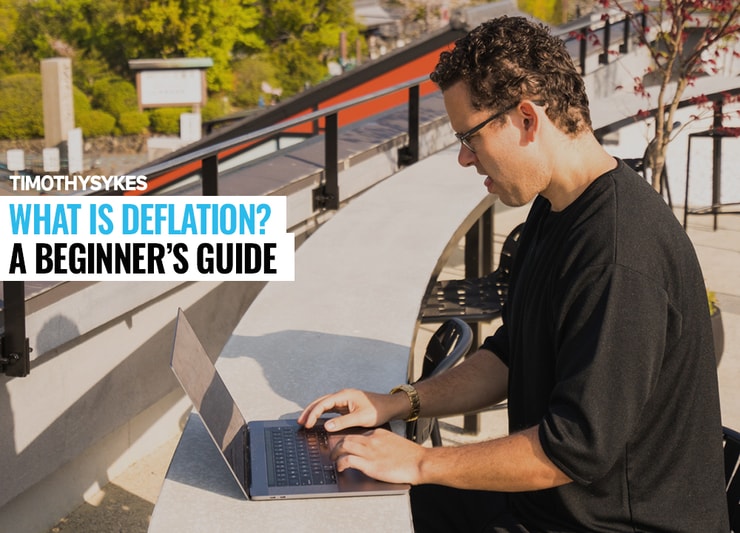At first glance, deflation might seem like a dream come true.
After all, if it’s the opposite of inflation, and that means that prices drop…
… that’s always awesome, right?
Not so fast. With those falling prices can come a number of potential pitfalls, including an unpredictable market and the risk of recession or even depression.
Want to learn the full story behind deflation?
In this post, I’ll explain what deflation is, why it matters, and how it can affect the economy. And, of course, I’ll get into what you as a trader can do to stay on top of market changes during times of deflationary pressure. Read on.
Table of Contents
What Is Deflation?
Deflation is a lowering of prices in the economy. Simple as that. If the overall cost goes down over a sustained period, it’s considered deflation.
But to really help you understand, let’s do a little visualization exercise.
Imagine you’re at the grocery store with a big ol’ basket. You put all sorts of things in it: some that you need and some that you want. Then, you head over to the register to pay.
When the clerk tells you the total, is it the same, lower, or higher than usual?
Sure, there can be natural variations — maybe yogurt was on sale this week, or you decided to go with the pricier organic chicken.
But week after week, month after month, is there a price trend in either direction?
To bring it back to deflation … let’s edit that exercise a little. Now, instead of a shopping basket, imagine a big figurative basket. It represents the economy and is filled with things like food, transportation, and medical care.
If the price of this basket — on average — drops in price for a sustained period … that’s deflation.
Deflation vs. Inflation
Deflation and inflation are basically the same, just opposites.
- Deflation is when prices in the economy decline. It’s actually sometimes even called “negative inflation.”
- Inflation is when prices in the economy increase.
Of course, inflation is a little trickier than that — to a certain degree, it’s inevitable. It’s when you have an extreme situation that things start to get sticky.
Deflation, on the other hand, might initially seem great (low prices, right?), but it can have effects that you may not have considered.
Deflation’s Effect on the Economy

2026 Millionaire Media, LLCDeflation represents prices going down. When you consider the long-term effects, though, it’s not always such a great thing.
Really, what’s happening is that prices are eroding because there’s lower demand. This can set off a series of unfortunate events: businesses start trying to compete by lowering prices. But over time, this can lead to trouble…
The increasing overhead and decreasing profit margins can mean that it’s harder to pay the bills.
If businesses can’t pay their bills, they can’t create products or continue to offer services.
Deflation Causes and Effects
So what causes deflation? Supply and demand. Specifically: lots of supply and little demand.
So why is demand so low? It could be for a variety of reasons. One might be that there’s less money in circulation. When there’s less money, it’s worth more, so there’s less of a desire to use it on products. That leads to a reduction in prices and a glut of products.
Companies and businesses have to lower prices to unload their goods, but people still aren’t buying. It’s like a standoff where more things can’t be produced and people don’t want to part with their precious cash.
Unfortunately, the long-term effects can be devastating. Companies may have to close facilities, reduce services, or lay off employees, which can increase unemployment. And it can become a continuing negative cycle … A higher unemployment rate means less spending, and that can quickly spiral into dire economic circumstances.
The Upside of Deflation
Don’t worry, it’s not all doom and gloom. There are some times when deflation isn’t necessarily a bad thing.
Deflation won’t necessarily have a bad effect on the economy if a business is able to lower prices due to lower production costs.
Example? Technology. Think about how relatively expensive things like computers and cell phones were even 20 years ago. They were cost-prohibitive to many.
But things are more streamlined now, and technology is easier and cheaper to produce. That means it’s cheaper to buy and more accessible to more people. Yet this hasn’t reduced the demand. If anything, quite the opposite.
Deflation Indicators
Here’s a great question: What are some of the signs that we’re headed into a deflationary period?
First, keep in mind that deflation is different from temporary price declines. This is important to note because our economy has become pretty complicated, and things like wars (trade or actual combat), for instance, can cause price declines.
A deflationary period means a sustained fall in the Consumer Price Index (CPI) or in the Gross Domestic Product (GDP).
It can be tough to predict deflationary times because the economy has gotten pretty complicated. That said, here are some potential signs of deflation on the horizon:
- A slowing global economy. When forecasts for GDP growth are constantly being cut or show a decline, this could be a sign of deflationary times to come. Even if employment numbers look promising, the GDP could tell a different tale.
- Falling commodity prices. Commodities can provide a good bird’s eye view of global production. If you notice that commodities like oil, precious metals, and so on are falling, it can be a sign of global growth slowing down and further price cuts to come.
- Drug prices going down. Did you know that drug costs are a huge part of the GDP? They’re included in its accounting for health care. Believe it or not, falling drug prices could be a sign of deflation. With groups like Amazon poised to potentially enter this marketplace, prices could stand to fall and change the economy in huge ways.
More Breaking News
- Navitas Semiconductor: Strategic Moves in GaN Technology
- SMXT Stock: Ride the Swell or Brace for Impact?
- RedHill’s Latest Leap: Game-Changer or Overhyped?
- Innodata’s Surge Amid Business Strategy Modifications
Deflation and Recession
One of the scariest things about deflation? It could lead to a recession. As the deflation cycle detailed above continues, it can turn into a bigger and bigger hole that’s harder to escape from. This could lead to a recession, or even worse, a depression.
Just for example, periods of deflation preceded the 2009 recession … and the Great Depression.
How Traders Can Outlast Deflationary Pressure
Are you suddenly feeling paranoid about falling prices and deflationary pressure squeezing in on you?
First, calm down. Now, read through these tips about how to outlast deflationary pressure:
- Build savings. Boring, right? But it’s always smart to invest in your savings. Intelligent traders don’t just blow everything they earn — they save a lot of what they make. You could re-invest some in trading but put some aside in a safe place too. A nest egg never hurt anyone.
- Revise your watchlist. Different times in the economy call for different approaches to trading. The same stocks that might perform well during active inflation might not perform as well during deflation. So, edit your watchlist in kind. FOR EXAMPLE, a period of deflation might bring more opportunities for short selling or taking longer positions in large-cap companies.
- Do your homework. When looking for opportunities in times of deflationary pressure, it’s extra important to do your homework and perform strong fundamental and technical stock research. Take time to check out the companies behind the stocks you trade. Look into how deflation could affect their offerings and the company’s health. Use a stock screener like StocksToTrade to really look at their chart. The cold, hard numbers can speak volumes, and patterns can potentially repeat!
- Make calculated trades. Don’t be a fool! If you do your research and determine that you’re interested in a particular stock, don’t get lazy when you’re almost there … Create a detailed trading plan where you plot out your entry and your exit. Plan to cut losses if necessary, and know where you’ll get out and take a profit. By writing this all down in a trading plan, you can be more likely to stick with it and avoid making stupid spur-of-the-moment decisions that can blow up your account.
Trading Challenge
Want to be a better trader? Educate yourself. Way too many traders blow up their accounts because they don’t bother to learn the rules. Then they unwittingly break them all and are surprised when it doesn’t work out.
I started my Trading Challenge as a way to help all the traders who were asking me for advice. I never had a trading education. I had to earn the hard way. Now, I help others with what I’ve learned in over 20 years, teaching my students what I wish I’d known…
But I don’t want to just teach you facts and figures. I want you to become self-sufficient so that you can adapt to different market conditions. In the Challenge, you’ll be part of a group of motivated trading peers. Follow their lead and be a dedicated student.
You’ll have plenty of resources: a huge library of videos, live webinars and trading sessions, and much, much more.
This is a real-life trading education, where I’m your strict disciplinarian … Just kidding! I’m your mentor.
Do yourself a favor: If you’re lazy or you think you can get rich quick by trading, move on. I’m serious about my Challenge, and I demand the same from my students. I want dedicated students who want to succeed and are willing to do what it takes to make their dreams a reality!
In Closing
As a trader, it’s important to stay up to date on the state of the economy, because it can help you make better decisions about what types of stocks to trade and help you organize an intelligent trading strategy.
The falling prices that come with deflation might initially seem exciting. But when you consider the bigger picture of the economy, those low prices can actually come with a pretty significant cost.
How are you prepared to deal with deflationary pressure? What’s your trading plan to survive an economic squeeze? Drop me a comment with your thoughts!












Leave a reply